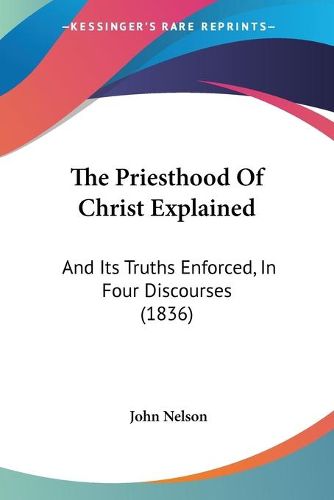Readings Newsletter
Become a Readings Member to make your shopping experience even easier.
Sign in or sign up for free!
You’re not far away from qualifying for FREE standard shipping within Australia
You’ve qualified for FREE standard shipping within Australia
The cart is loading…






The Priesthood of Christ Explained: And Its Truths Enforced, In Four Discourses is a book written by John Nelson in 1836. The book is a collection of four discourses that explain the concept of the priesthood of Christ and its importance in Christianity. Nelson uses biblical references to support his arguments and to show how the priesthood of Christ is different from the priesthood of the Old Testament. The book is divided into four sections, each of which focuses on a different aspect of the priesthood of Christ. The first section discusses the nature of Christ's priesthood and how it relates to his role as a mediator between God and humanity. The second section explores the sacrifices that Christ made on behalf of humanity and how they differ from the sacrifices of the Old Testament. The third section discusses the benefits that Christians receive from Christ's priesthood, including forgiveness of sins and access to God. The final section focuses on the importance of faith and obedience in maintaining a relationship with Christ.Overall, The Priesthood of Christ Explained: And Its Truths Enforced, In Four Discourses is a comprehensive guide to understanding the role of Christ's priesthood in Christianity. It provides a clear and concise explanation of the concept and its significance for believers. The book is suitable for anyone seeking a deeper understanding of Christianity and the teachings of Christ.This scarce antiquarian book is a facsimile reprint of the old original and may contain some imperfections such as library marks and notations. Because we believe this work is culturally important, we have made it available as part of our commitment for protecting, preserving, and promoting the world's literature in affordable, high quality, modern editions, that are true to their original work.
$9.00 standard shipping within Australia
FREE standard shipping within Australia for orders over $100.00
Express & International shipping calculated at checkout
The Priesthood of Christ Explained: And Its Truths Enforced, In Four Discourses is a book written by John Nelson in 1836. The book is a collection of four discourses that explain the concept of the priesthood of Christ and its importance in Christianity. Nelson uses biblical references to support his arguments and to show how the priesthood of Christ is different from the priesthood of the Old Testament. The book is divided into four sections, each of which focuses on a different aspect of the priesthood of Christ. The first section discusses the nature of Christ's priesthood and how it relates to his role as a mediator between God and humanity. The second section explores the sacrifices that Christ made on behalf of humanity and how they differ from the sacrifices of the Old Testament. The third section discusses the benefits that Christians receive from Christ's priesthood, including forgiveness of sins and access to God. The final section focuses on the importance of faith and obedience in maintaining a relationship with Christ.Overall, The Priesthood of Christ Explained: And Its Truths Enforced, In Four Discourses is a comprehensive guide to understanding the role of Christ's priesthood in Christianity. It provides a clear and concise explanation of the concept and its significance for believers. The book is suitable for anyone seeking a deeper understanding of Christianity and the teachings of Christ.This scarce antiquarian book is a facsimile reprint of the old original and may contain some imperfections such as library marks and notations. Because we believe this work is culturally important, we have made it available as part of our commitment for protecting, preserving, and promoting the world's literature in affordable, high quality, modern editions, that are true to their original work.